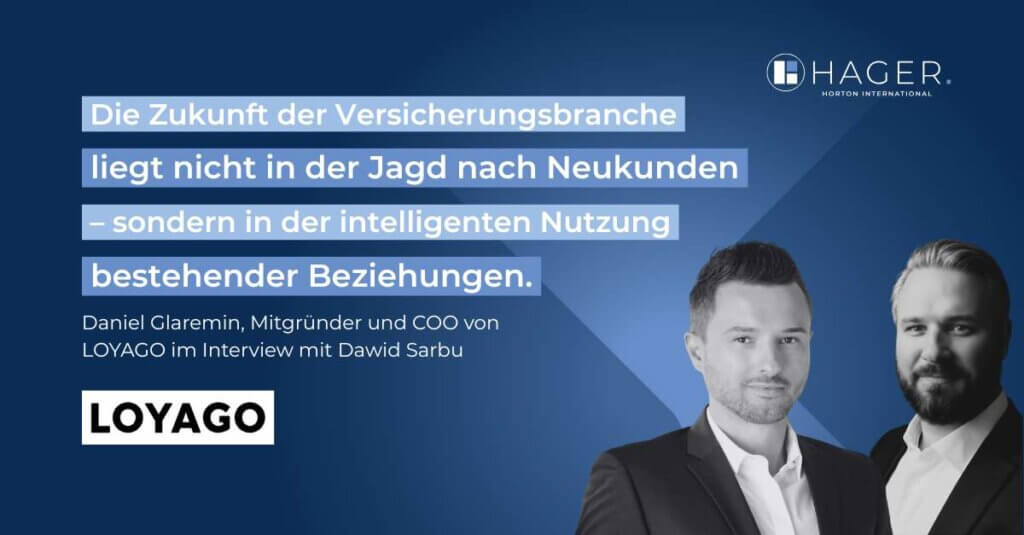In an interview with Dawid Sarbu.

Daniel Glaremin is a German insurance expert and entrepreneur. He is considered an expert in setting up start-ups and has over 15 years of experience in the insurance sector. As co-founder and COO of LOYAGO, he and his team are building the agency of the future: data-driven, technology-driven, and consistently customer-focused.
Future strategies for the insurance industry
Dawid Sarbu: Daniel, I’m glad it worked out and you’re here today! Before we get into the details—for those who don’t know LOYAGO yet—can you please briefly explain what LOYAGO stands for and what you do?
Daniel Glaremin: LOYAGO was born out of over ten years of experience in the brokerage market. We noticed that the number of insurance policies in Germany is steadily increasing—it is expected to reach the 500 million mark in 2028—while the number of brokers is declining significantly. This is leading to a growing gap between service needs and available resources. At the same time, acquiring new customers via platforms such as Google or Meta is becoming increasingly expensive, while the quality of leads is declining.
Our response to this is to focus on existing customers. Many insurers have customers with one or two policies, although the average number is more likely to be between five and eight. We take on portfolios as a multi-agency, activate them, carry out several service interactions per year, enrich data, and thus increase contract penetration. Our goal: to inspire customers who have previously only received their premium invoices with hyper-personalized added value and thus develop them into loyal regular customers. This creates a real win-win situation for both the customer and the insurer.
Focus on existing customers: Growth through customer loyalty
Dawid Sarbu: Exciting—especially the focus on existing customers, which is an approach that many don’t really consider. That sounds like a clear strategy that not only works in the short term but also pays off in the long term. Speaking of the long term, what is your vision for LOYAGO?
Daniel Glaremin: We want to help shape the “agency of the future”: data-driven, technology-supported, efficient—and personal where it adds value. We also want to improve the image of insurance sales. The profession often ranks low in popularity polls, even behind politics. We are convinced that this does not have to remain the case and want to show that the industry has many committed and competent minds. By protecting people from the consequences of serious misfortunes and thus saving them from financial ruin, among other things, we are doing a very important and honorable job. We can be proud of that.
Differentiation in the market: Digitalization without complexity
Dawid Sarbu: That sounds like a real cultural shift in the industry—and also like you’re setting high standards for yourselves. Looking at the market, what specifically sets your approach apart from others
Daniel Glaremin: Working with existing portfolios is nothing new, but we are strategically focusing on it. We use insurers’ existing processes to avoid creating additional complexity and take care of translating the data into our systems. This allows us to get started quickly—often within one to two weeks—and keep the effort required on the part of the insurer to a minimum.
Recruiting in the insurtech environment: When external expertise is crucial
Dawid Sarbu: I see—so rapid implementation with minimal friction for the insurer. To drive this forward, you certainly need the right people. How do you find them, and do you work with headhunters?Dawid Sarbu: I see—so rapid implementation with minimal friction for the insurer. To drive this forward, you certainly need the right people. How do you find them, and do you work with headhunters?
Daniel Glaremin: The team is an important and decisive factor. We usually recruit for operational roles ourselves. For key positions, especially in management, headhunters are an excellent addition and support. We have repeatedly relied on them in my previous positions. Especially when specific skills and experience are required. For example, for CFOs and managers with IPO experience. Startups often grow faster than structures can be built. In such phases, external support is valuable in bringing targeted experience into the company.
Artificial intelligence in insurance sales: efficiency meets data protection
Dawid Sarbu: It’s clear that you know exactly when you need external expertise and when you don’t.
To support and drive their business forward, many companies are also relying on tools and increasingly using artificial intelligence. This is currently a much-discussed topic, which I would also like to highlight here. What role does artificial intelligence play at LOYAGO?
Daniel Glaremin: We use AI in a targeted manner, for example for knowledge databases, document processing, data classification, and process automation. We host many systems ourselves in order to meet data protection requirements in a regulated environment. A key problem in the industry is data quality: basic contact details are often missing or out of date. Without this foundation, even the best AI is useless. That’s why our first step is data enrichment.
We use AI where it brings efficiency gains and can be operated in compliance with data protection regulations—for example, in automated document processing, the transcription of conversations, or the structured preparation of data for personalized customer communication. We do not currently use chatbots, as based on our customer base structure, personal contact is still highly relevant for many existing customers and is also very important to us.
Market trends in insurtech: consolidation and access to capital
Dawid Sarbu: Very exciting—especially that you are using AI in such a targeted way. Looking at the bigger picture, how do you assess the current situation in the insurtech market?
Daniel Glaremin: The market is currently undergoing a period of consolidation. The insurtech sector was a huge hype – just like fintech before it. Capital has become more expensive, and a lot of money is currently flowing into AI start-ups and the defense industry. Nevertheless, financing opportunities still exist if the business case is convincing. Private equity funds and broker pools are increasingly investing in portfolio acquisitions and consolidation. This development began earlier in the US. Challenges exist primarily in terms of access to capital: venture capital often comes from abroad, which means that profits flow out of the country. Support programs are available, but access is bureaucratic and opaque. Differences between banks, long processing times, and the need for external funding advisors complicate the process. I therefore believe that we in the insurance industry would be well advised to develop more courageous cooperation and innovation within the industry itself.
Digitalization potential: How insurers can catch up
Dawid Sarbu: We hear that a lot, and it sounds like a challenging phase. Speaking of challenges, where do you see the greatest potential for digitalization in the insurance industry?
Daniel Glaremin: Many management systems are 20 to 25 years old or older. The legacy is huge, data quality could be improved, processes are not fast enough, and too often there is still too little real focus on customer needs. Modernization projects often take many years. This creates great potential for the automation of manual processes, the integration of LegalTech solutions, the optimization of marketing and sales interfaces, and platform models for end customer interaction. Strong regulation slows down innovation, but also offers opportunities for specialized solutions.
Cooperation instead of disruption: The new collaboration between insurers and insurtechs
Dawid Sarbu: So there is still a lot of untapped potential there. We hear that a lot when it comes to regulation. I would also be interested to know how the relationship between insurers and insurtechs has changed in recent years.
Daniel Glaremin: A few years ago, many insurers viewed insurtech companies as potential disruptors. Today, a cooperative approach prevails. Insurtech companies usually focus on parts of the value chain, not the entire chain. They are increasingly being integrated like normal sales partners.
Success factors for the future: inventory management, AI, and cooperation
Dawid Sarbu: Looking ahead, what factors will be crucial for the success of insurtech companies in the coming years?
Daniel Glaremin: First, inventory management will become a key issue. Second, AI offers potential for efficiency gains, but it depends on high-quality data. Third, access to capital must be secured—ideally more from Germany and the EU. Fourth, cooperation between insurers and insurtechs will become more important, while disruptive approaches will become less common.
Conclusion: The insurance industry in transition – data-driven, customer-centric, human
Dawid Sarbu: Thank you very much for talking to us, Daniel. I understand that insurtechs have great potential and are gaining acceptance in the industry. However, it will take time, effort, and helpful political decisions before they achieve the standing that some well-known fintechs already have. But things are clearly moving in the right direction. I’ll leave the last word to you—do you have any final thoughts on the subject?
Daniel Glaremin: The future of the insurance industry lies in the intelligent use of existing customer relationships, supported by targeted AI deployment and data-driven processes—not in the pure pursuit of new customers.



